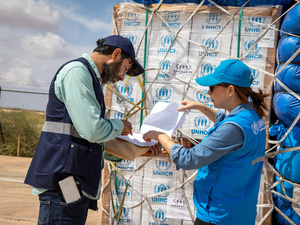Micro-finance and refugees, by Dominik Bartsch
Micro-finance and refugees, by Dominik Bartsch
Over the past decade or so, micro-finance (MF) has assumed an increasingly important role in the drive towards the economic and social empowerment of refugees. Micro-credit and savings schemes are operated in a number of refugee situations, ranging from camp based local integration programmes, to interventions for urban refugees and support to returning refugees in the context of reintegration and rehabilitation programmes.
However, only limited analysis is available on the effectiveness of micro-finance as a tool in promoting refugee livelihoods. Short of answering this question empirically, the following five pointers contain lessons learnt from field operations and offer a glimpse at some of the underlying difficulties in operating micro-finance interventions effectively in the refugee context.
- Micro-finance rests on the notion of group solidarity to replace what in commercial banking would be a material form of surety. While such solidarity is in strong evidence amongst cohesive rural communities (the Bengali village women), it is the least developed amongst refugee caseloads comprising multiple nationalities and diverse ethnic backgrounds. Solidarity as a social glue, after all, bears a close relation with residency or geographical belonging and that is precisely the weak part in any refugee's life; one may even conclude that the trauma of displacement acts as an outright deterrent to the concepts of solidarity and community. Much as some refugee settlements of long standing, especially in Africa, may resemble homogeneous communities, they usually have not brought about the type of cohesion conducive to mutual monitoring and, perhaps more importantly, the imposition of social sanctions against defaulters. This problem is all the more prevalent amongst urban refugee caseloads who tend to be very mobile, even across borders (vide irregular movements in Southern Africa).
- MF has evolved into a discipline in its own right, much more closely related to banking than to relief. Without the necessary technical experience in "banking for the poor", only scant attention will be paid to key financial benchmarks: UNHCR may consider a repayment rate of 50% quite acceptable although 'best practice' would demand much higher rates of around 95% and indeed complete sustainability within a couple of years to cover all administrative costs. Where UNHCR engages Implementing Partners to administer MF programmes, this is still considered to be part of a relief intervention and not a commercial venture. This perception is shared by refugee beneficiaries themselves: they would look upon UNHCR as the purveyor of discretionary assistance and will therefore find it difficult to accept MF rules, far less be able to comply with them. Faced with this moral hazard, UNHCR will routinely "give in" when, for instance, negotiating interest rates below market rates. No surprise, then, that such loans appear to mutate into grants over time - which begs the question why the intervention was not designed as grant aid in the first place.
- The underlying contradiction between banking and relief also extends to the selection of beneficiaries: the clients who are most likely to benefit from MF are those already endowed with business acumen and, often enough, sufficient resources to sustain themselves. The ones who are most likely to fail with their ventures and default on their payments are precisely those whom UNHCR would want to help the most: vulnerable cases such as widows or single parent mothers. This clash of business versus charity is probably irreconcilable in the refugee context and it usually produces a veritable mismatch between intended and actual beneficiaries.
- UNHCR's internal financial and budgetary management systems do not lend themselves to multi-year interventions such as MF. Even where UNHCR succeeds in setting up separate instruments such as multi-year agreements on the management of revolving funds, there is no institutional accountability requirement since the initial setting up of a MF facility will be recorded and accounted for as a one-time expenditure during the first year of operation. Where UNHCR agrees to collaborate with an experienced MF provider (which are usually focused on nationals), this often has to be compensated through significant safeguards with which the MF provider covers the additional risks brought about through the inclusion of refugees in their loan portfolio, in order to protect overall repayment rates. Those arrangements can get overly complex (setting up of loan guarantee fund) and may ultimately turn out to be self-defeating because access for refugees will only be granted to the most exceptional (i.e. safest) business proposals.
- MF is but one element in the facilitation of refugee self-reliance and the promotion of sustainable livelihoods. To be successful, it needs to be supported by other targeted interventions such as business training and, most importantly, an enabling environment. Government restrictions on refugee mobility, for instance, directly impact on market access for refugee products and may therefore constitute a much bigger obstacle than, say, the cost of financing. Indeed, any one of the numerous regulatory requirements (work permits, business licence) can very easily nullify the prospects for what otherwise may have been a sound business proposition. If MF is pursued in isolation from other interventions and not based on a thorough understanding of what constitutes viable avenues for self reliance, it may easily become a "strategic fig leaf"; an activity that is implemented because it is presumed to be effective as opposed to one that is known to be effective.
Dominik Bartsch
UNHCR - EPAU


